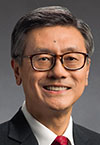The New NUS: To Amplify, and Not Diminish, the University Scholars Programme and Yale-NUS Story
September 13, 2021
IN BRIEF | 5 min read
-
Since 2018, NUS has charted and implemented a planned series of educational innovations. COVID-19 brought home the importance of ensuring that our students are well prepared to thrive in a more uncertain world. In a world of change and uncertainty, students will need broad intellectual foundations, so that they can engage in lifelong learning across many fields. Students will also need to develop the ability, agility and attitudes to adapt as their world changes at an increasing pace.

| By Professor Tan Eng Chye |
No one who has stepped into the Yale-NUS campus can doubt that it holds a special place within NUS – greatly prized, carefully tended and superbly resourced. Yale-NUS is a cherished part of our community. All NUS facilities are open to Yale-NUS students, in good times, our professors celebrate winning research grants together; in tough times, at the height of the COVID-19 pandemic, NUS opened its hostels for Yale-NUS students who were quarantined.
Two weeks ago, we announced we were combining Yale-NUS College (Yale-NUS) with our University Scholars Programme (USP). Though we have committed to ensuring the full Yale-NUS experience for all its students until College is wound down in 2025, I understand the deep sense of loss the Yale-NUS community feels because the College, its culture and legacy, and its beautiful spaces are without equal.
Like many of my colleagues, I consider Yale-NUS a great success. This move to embed an interdisciplinary liberal arts education within NUS is meant to amplify, not diminish, the Yale-NUS story.
The question is how best to do this.
Since I became President in 2018, Yale-NUS’ finances have weighed heavily on my mind. Since the inception of Yale-NUS, MOE has provided significant funding to Yale-NUS during its earlier years stretching to 2022, while it was ramping up enrolment and building its endowment. After that, NUS and Yale-NUS would carry Yale-NUS’ financial commitments with the regular capitation funding, as with all Autonomous Universities in Singapore, to be supplemented with endowment income.
Despite hard work and best attempts by all parties, Yale-NUS raised less than S$80 million of endowed donations, about a quarter of the over S$300 million target which is required to build an endowment of around S$1 billion. So, even with generous government seed funding and matching, the Yale-NUS endowment is much smaller than needed to sustain it.
Today, Yale-NUS operates with a ratio of 8 students to 1 faculty member – compared to more than 12 to 1 in the USP, and 17 to 1 in the rest of NUS. Furthermore, the majority of Yale-NUS students are on financial aid. Hence, the resources required to operate Yale-NUS are much higher than we had planned.
Therefore, to make Yale-NUS financially sustainable in the long run, we would need to make adjustments to the immersive small group learning environment, among other aspects that would be adversely affected. At the same time, tuition fees would have to increase significantly.
Prime Minister Lee Hsien Loong’s speech at Yale-NUS’ groundbreaking in 2012 is instructive. He spoke about Yale-NUS’ “broad-based, multidisciplinary undergraduate curriculum” and its “immersive residential college system” which followed the traditions of not just Yale, but also that of older universities like Oxford and Cambridge “to promote personal and intellectual growth.”
He said “we hope (Yale-NUS) will combine the best of East and West, that takes the best of US liberal arts education from Yale, New Haven, adds NUS’ distinctive Asian and global strengths, adapts this mix to our different social and cultural contexts, and creates an experience which is more relevant to students from Singapore and Asia, or most of whom will be from Singapore and Asia…It is not a replica of Yale, but a bold effort to create something new and different.”
In its time, Yale-NUS has fulfilled these ambitions and more.
But there is another source of similar ambitions within NUS. Some 10 years before the creation of Yale-NUS, NUS created the USP, bringing together an extraordinary group of students and professors. This programme has a strong core curriculum, emphasising broad interdisciplinary education and developed with input from Harvard University. The USP draws resources and deep expertise from all over NUS, including the Schools of Business, Computing, Design and Environment as well as the Faculties of Law, Science, Engineering, and Arts & Social Sciences.
In the US, the USP would be considered an honours college, and does not confer a liberal arts degree. In honours colleges within large US public universities, high-achieving students are offered the same intensive learning experience fostered at small liberal arts colleges but at a far lower cost. Within NUS, the USP is a much sought-after, high-quality source of broad-based interdisciplinary education. It is an exceptional and extraordinarily successful residential programme, and a beacon of high value and scholarship. It too, represents something new and different.
Given all of the above, we therefore decided that combining the USP and Yale-NUS would allow us to preserve the distinctive educational approaches that both have been working hard to refine over the years, resulting in a New College which will be greater than the sum of its parts. The overriding reason for this move is the vital role that a broad-based interdisciplinary education plays within the reimagining of higher education at NUS.
Since 2018, NUS has charted and implemented a planned series of educational innovations. COVID-19 brought home the importance of ensuring that our students are well prepared to thrive in a more uncertain world. In a world of change and uncertainty, students will need broad intellectual foundations, so that they can engage in lifelong learning across many fields. Students will also need to develop the ability, agility and attitudes to adapt as their world changes at an increasing pace.
We have been working on educational reforms to deliver three things. Firstly, a common curriculum that builds intellectual versatility. Second, flexible pathways that allow for students to customise their learning and to pivot to their strengths and aspirations. Finally, interdisciplinarity – the opportunity for broader learning across a range of disciplines.
Slowly but surely, we are building a new NUS. The formation of the College of Humanities and Sciences (CHS) in December 2020, and the newly announced College of Design and Engineering (CDE) are all part of this roadmap.
The New College is our third step. The merger is possible because CHS and CDE have adopted a curriculum framework similar to Yale-NUS. Its funding model will be more closely aligned with the broad, sustainable model we have adopted across NUS, as well as our philosophy of providing support for financially disadvantaged Singaporean students. The New College will be more sustainable, inclusive and accessible to all potential NUS students.
It will provide a broad-based, interdisciplinary common curriculum to allow students access to many more disciplines – Science, Engineering, Design, Law and Computing, in addition to the Humanities, Social Sciences and Sciences. Our hope is that it will offer an even more diverse common curriculum than its predecessors: the USP or Yale-NUS.
On top of flexible access to multiple pathways and specialisations, students will continue to experience immersive learning, small group teaching and vibrant residential living – hallmarks of the New College.
We have set up a Planning Committee to work with professors and students from USP and Yale-NUS, as well as the rest of NUS, for a collaborative, sensitive and thoughtful transition over the next four years.
In mathematics, there is a way of solving problems mimicking genetic algorithms, by which a group of solutions evolve towards ever better solutions. A “crossover operator” combines the best elements of two or more prior solutions to generate better ones. Each solution therefore has something special, and contributes towards the next generation. Over time, generations iterate and become better at solving problems. The old becomes something new, and yet, not completely different.
In the same way, it is my firm hope that New College will carry with it the rich histories of USP and Yale-NUS, while providing more students with the greater reach and range of educational pathways afforded by the entire NUS ecosystem. I believe everyone in the NUS community – including USP and Yale-NUS – can join in this bold effort to create something new, and yet, not so different.
About the author

Professor Tan Eng Chye is President of the National University of Singapore. He is a mathematician and an alumnus of NUS and Yale University, making him a crossover operator himself.
This article was published in The Straits Times on 11 September 2021 and appeared on NUSnews on 11 September 2021.

